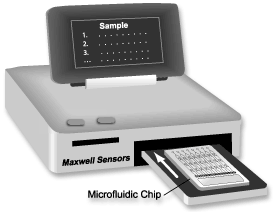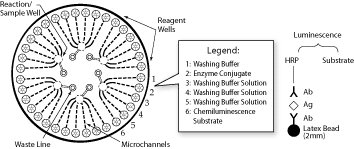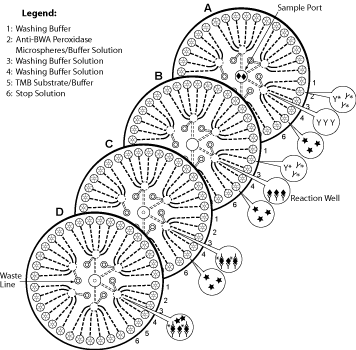|
Multi-step laboratory analysis, used throughout the scientific arena, is
expensive and time-intensive. Maxwell Sensorsí patented microfluidic
disc approach reduces the multi-step, multi-analyte assay into a single,
accurate, computer-driven procedure using miniaturization, integration
and total automation technology.
The Microfluidic Chemiluminescence (MCL)-Disc is designed to automate
multi-step immunoassay and nucleic acid assay on a small cartridge
platform. The disc contains all the necessary reagents and solutions in
microliter volumes. The microfluidic system utilizes a micro-actuator to
release reagents from compartments and controls both fluid dynamics and
multi-step biochemical reactions, reducing the complicated operational
procedure to a single step.
The sequence of the fluid dynamics and biochemical reactions depends on
the specific bioassay. During the assay procedure the actuator
sequentially transfers a pocket of reagent from one microwell to
another, initiates chemical reactions, mixes the reagents, rinses off
unbound species, and removes residual solution into a waste reservoir.
The microfluidic system uses a central microprocessor to control the
modular components: micro-actuator (fluid delivery), rotational
stage (mixing), magnet (purification), peltier heater and
cooler (amplification), vacuum line (waste removing),
detector (signal detection), data acquisition system, and so on.
All of the components are integrated onto the portable system. The disc
is placed on a rotational stage, which positions a specific microwell
under the actuator. The system sequentially delivers reagents into the
reaction well, mixes, incubates, and then removes the solution away to
an external waste reservoir. The system can reliably deliver the liquid
with near 100% efficiency and accuracy.


MCL Disc

|
The schematic shows the ELISA-Disc
sandwich immunoassay protocol. (A)
Before and (B) after delivery of the
sample to the reaction wells, (C)
Removal of unbound species by
washing, and delivery of the enzyme
conjugates, (D) Removal of unbound
species by washing, and delivery of
the enzyme substrate. The color
change (ELISA) or chemiluminescence
occurs only at the reaction wells
where the sandwich immuno-complex,
Ab-Ag-Ab*, that indicates positive
identification, is formed. |
|
Top
MSI has combined chemiluminescence with an improved approach to current
microfluidics technology.
∑
Its proprietary 3-D microfluidic configuration eliminates a common
problem associated with microfluidics - dead volumes or air bubbles
trapped inside the microfluidic system.
∑
The operating procedure is totally automated and easy enough to be used
by personnel with minimal training.
∑
Simultaneous multi-analyte testing on the same disc saves substantial
time compared with conventional sequential analyte tests.
∑
MSIís technology is offered at a much lower cost than other
microfluidics systems available in the marketplace.
Microfluidic disc technology can apply to any laboratory setting.
∑
Drug Development - Only one-tenth of the drug compounds that enter the
clinical trial phase become commercially available at an average cost of
$800 million per approved drug. As a result, pharmaceutical companies
are constantly searching for faster, more accurate and less costly
methods to discover drugs likely to survive clinical testing. MSIís
microfluidic disc technology can dramatically improve target screening
throughput.
∑
Diagnostic Testing Ė At the present time, many diagnostic tests require
multiple laboratory steps to reach an accurate conclusion. MSIís
microfluidic disc technology can improve the speed of diagnostic testing while lowering
the price.
∑
Critical Care - Diagnosing chest pain in the acute care setting requires
immediate testing for cardiac enzyme markers. Today, the choices are to
utilize central lab testing at a typical 60 minute turn around time or
perform faster bedside testing that cannot be compared with later
central lab test results due to different testing protocols. Cardiac
care can be measurably improved by reducing turnaround time for
cardiac enzyme testing and utilizing
identical protocols across all testing modalities, using MSI micro
fluidic disc technology.
∑
Other applications - DNA chip, proteomics, molecular medicines, nucleic
acid micro extraction and purification, cell surface and intracellular
protein targets analysis, cellular protein expression, fluorescence, and
chemiluminescence.
Contact Maxwell Sensors
to discuss how our Micro Fluidics Disc technology can
benefit your organization.
|